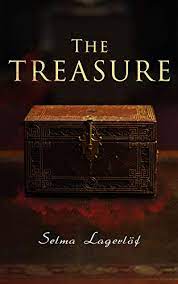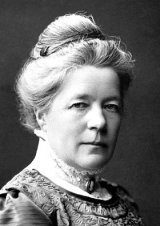The Treasure Page #2
The Treasure is a 1904 novel by the Swedish writer Selma Lagerlof. Its original Swedish title is Herr Arnes penningar, which means "Mr. Arne's money". It has also been published in English as Herr Arne's Hoard. Set in Bohuslän in the 16th century, it tells the story of a group of Scottish mercenaries who escape from prison; they go on to murder a family to steal a treasure chest, after which one of them falls in love with the family's sole survivor.
At the farthest end of the table sat two children. One of them was Herr Arne's niece, a child of no more than fourteen years. She was fair-haired and of delicate build; her face had not yet reached its fullness, but had a promise of beauty in it. She had another little maid sitting beside her, a poor orphan without father or mother, who had been given a home at the parsonage. The two sat close together on the bench, and it could be seen that there was great friendship between them. All these folk sat at meat in the deepest silence. Torarin looked from one to another, but none was disposed to talk during the meal. All the old servants thought to themselves: "It is a goodly thing to be given food and to be spared the sufferings of want and hunger, which we have known so often in our lives. While we are eating we ought to have no thought but of giving thanks to God for His goodness." Since Torarin found no one to talk to, his glance wandered up and down the room. He turned his eyes from the great stove, built up in many stages beside the entrance door, to the lofty four-post bed which stood in the farthest corner of the room. He looked from the fixed benches that ran round the room to the hole in the roof, through which the smoke escaped and wintry air poured in. As Torarin the fish hawker, who lived in the smallest and poorest cabin on the outer isles, looked upon all these things, he thought: "Were I a great man like Herr Arne I would not be content to live in an ancient homestead with only one room. I should build myself a house with high gables and many chambers, like those of the burgomasters and aldermen of Marstrand." But more often than not Torarin's eyes rested upon a great oaken chest which stood at the foot of the four-post bed. And he looked at it so long because he knew that in it Herr Arne kept all his silver moneys, and he had heard they were so many that they filled the chest to the very lid. And Torarin, who was so poor that he hardly ever had a silver piece in his pocket, said to himself: "And yet I would not have all that money. They say Herr Arne took it from the great convents that were in the land in former days, and that the old monks foretold that this money would bring him misfortune." While yet these thoughts were in the mind of Torarin, he saw the old mistress of the house put her hand to her ear to listen. And then she turned to Herr Arne and asked him: "Why are they whetting knives at Branehog?" So deep was the silence in the room that when the old lady asked this question all gave a start and looked up in fright. When they saw that she was listening for something, they kept their spoons quiet and strained their ears. For some moments there was dead stillness in the room, but while it lasted the old woman became more and more uneasy. She laid her hand on Herr Arne's arm and asked him: "How can it be that they are whetting such long knives at Branehog this evening?" Torarin saw that Herr Arne stroked her hand to calm her. But he was in no mind to answer and ate on calmly as before. The old woman still sat listening. Tears came into her eyes from terror, and her hands and her head trembled more and more violently. Then the two little maids who sat at the end of the table began to weep with fear. "Can you not hear them scraping and filing?" asked the old mistress. "Can you not hear them hissing and grating?" Herr Arne sat still, stroking his wife's hand. As long as he kept silence no other dared utter a word. But they were all assured that their old mistress had heard a thing that was terrifying and boded ill. All felt the blood curdling in their veins. No one at the table raised a bit of food to his mouth, except old Herr Arne himself. They were thinking of the old mistress, how it was she who for so many years had had charge of the household. She had always stayed at home and watched with wise and tender care over children and servants, goods and cattle, so that all had prospered. Now she was worn out and stricken in years, but still it was likely that she and none other should feel a danger that threatened the house. The old lady grew more and more terrified. She clasped her hands in her helplessness and began to weep so sorely that the big tears ran down her shrunken cheeks. "Is it nothing to you, Arne Arneson, that I am so sore afraid?" she complained. Herr Arne bent his head to her and said: "I know not what it is that affrights you." "I am in fear of the long knives they are whetting at Branehog," she said. "How can you hear them whetting knives at Branehog?" said Herr Arne, smiling. "The place lies two miles from here. Take up your spoon again and let us finish our supper." The old woman made an effort to overcome her terror. She took up her spoon and dipped it in the milk bowl, but in doing it her hand shook so that all could hear the spoon rattle against the edge. She put it down again at once. "How can I eat?" she said. "Do I not hear the whining of the whetstone, do I not hear it grating?" At this Herr Arne thrust the milk bowl away from him and clasped his hands. All the others did the same, and the curate began to say grace. When this was ended, Herr Arne looked down at those who sat along the table, and when he saw that they were pale and frightened, he was angry. He began to speak to them of the days when he had lately come to Bohuslen to preach the Lutheran doctrine. Then he and his servants were forced to fly from the Papists like wild beasts before the hunter. "Have we not seen our enemies lie in wait for us as we were on our way to the house of God? Have we not been driven out of the parsonage, and have we not been compelled to take to the woods like outlaws? Does it beseem us to play the coward and give ourselves up for lost on account of an evil omen?" As Herr Arne said this he looked like a valiant champion, and the others took heart anew on hearing him. "Ay, it is true," they thought. "God has protected Herr Arne through the greatest perils. He holds His hand over him. He will not let His servant perish." III As soon as Torarin drove out upon the road his dog Grim came up to him and jumped up on to the load. When Torarin saw that the dog had been waiting outside the parsonage his uneasiness came back. "What, Grim, why do you stay outside the gate all the evening? Why did you not go into the house and have your supper?" he said to the dog. "Can there be aught of ill awaiting Herr Arne? Maybe I have seen him for the last time. But even a strong man like him must one day die, and he is near ninety years old." He guided his horse into a road which led past the farm of Branehog to Odsmalskil. When he was come to Branehog he saw sledges standing in the yard and lights shining through the cracks of the closed shutters. Then Torarin said to Grim: "These folks are still up. I will go in and ask if they have been sharpening knives here tonight." He drove into the farmyard, but when he opened the door of the house he saw that a feast was being held. Upon the benches by the wall sat old men drinking ale, and in the middle of the room the young people played and sang.
Translation
Translate and read this book in other languages:
Select another language:
- - Select -
- 简体中文 (Chinese - Simplified)
- 繁體中文 (Chinese - Traditional)
- Español (Spanish)
- Esperanto (Esperanto)
- 日本語 (Japanese)
- Português (Portuguese)
- Deutsch (German)
- العربية (Arabic)
- Français (French)
- Русский (Russian)
- ಕನ್ನಡ (Kannada)
- 한국어 (Korean)
- עברית (Hebrew)
- Gaeilge (Irish)
- Українська (Ukrainian)
- اردو (Urdu)
- Magyar (Hungarian)
- मानक हिन्दी (Hindi)
- Indonesia (Indonesian)
- Italiano (Italian)
- தமிழ் (Tamil)
- Türkçe (Turkish)
- తెలుగు (Telugu)
- ภาษาไทย (Thai)
- Tiếng Việt (Vietnamese)
- Čeština (Czech)
- Polski (Polish)
- Bahasa Indonesia (Indonesian)
- Românește (Romanian)
- Nederlands (Dutch)
- Ελληνικά (Greek)
- Latinum (Latin)
- Svenska (Swedish)
- Dansk (Danish)
- Suomi (Finnish)
- فارسی (Persian)
- ייִדיש (Yiddish)
- հայերեն (Armenian)
- Norsk (Norwegian)
- English (English)
Citation
Use the citation below to add this book to your bibliography:
Style:MLAChicagoAPA
"The Treasure Books." Literature.com. STANDS4 LLC, 2024. Web. 10 Nov. 2024. <https://www.literature.com/book/the_treasure_6>.




Discuss this The Treasure book with the community:
Report Comment
We're doing our best to make sure our content is useful, accurate and safe.
If by any chance you spot an inappropriate comment while navigating through our website please use this form to let us know, and we'll take care of it shortly.
Attachment
You need to be logged in to favorite.
Log In